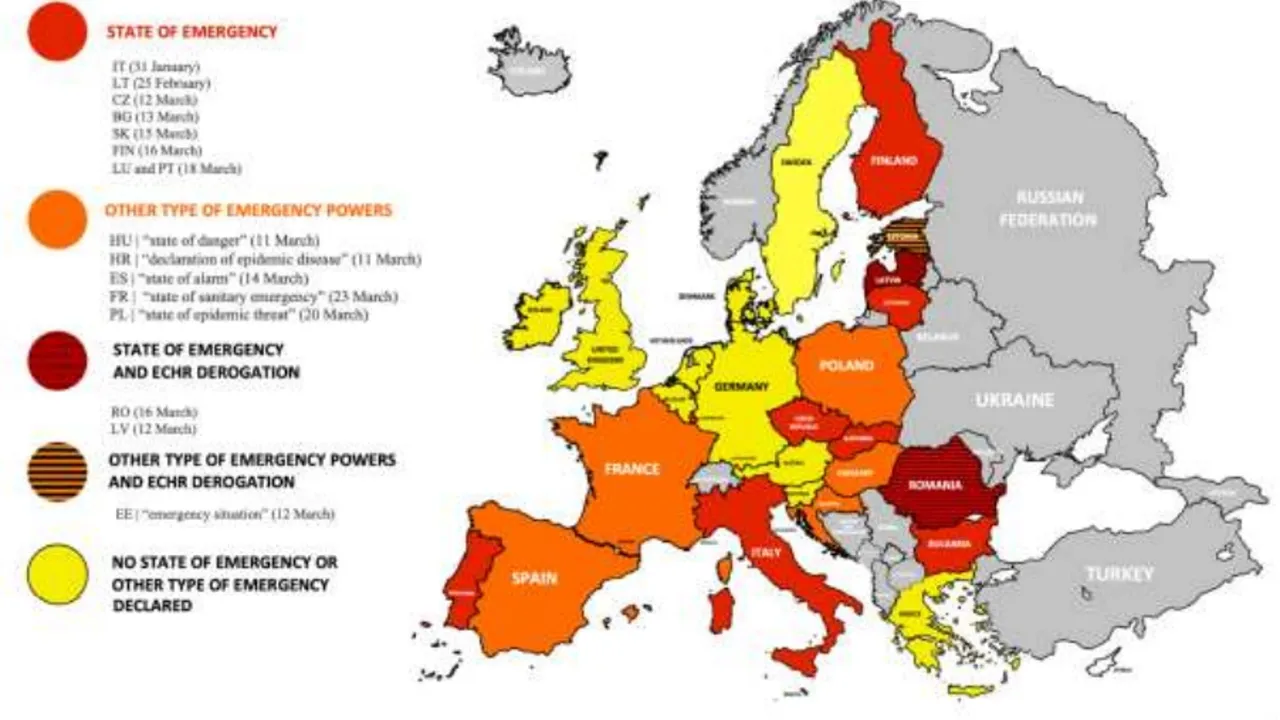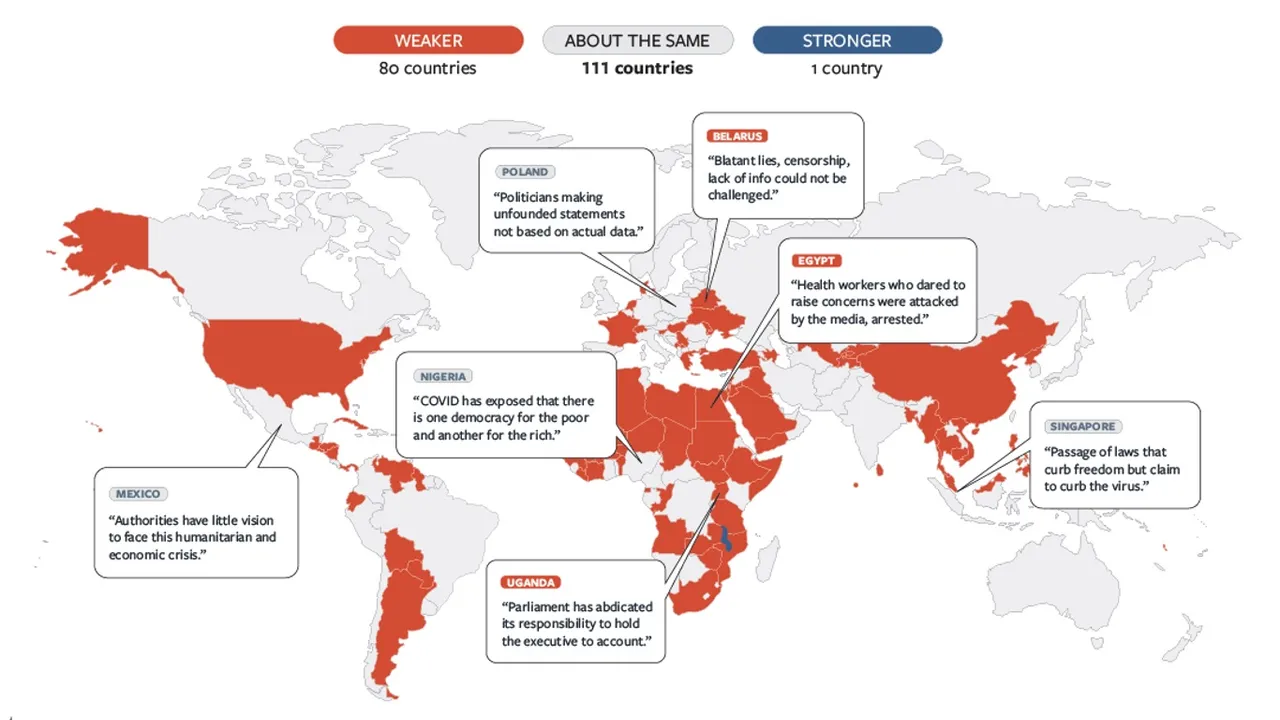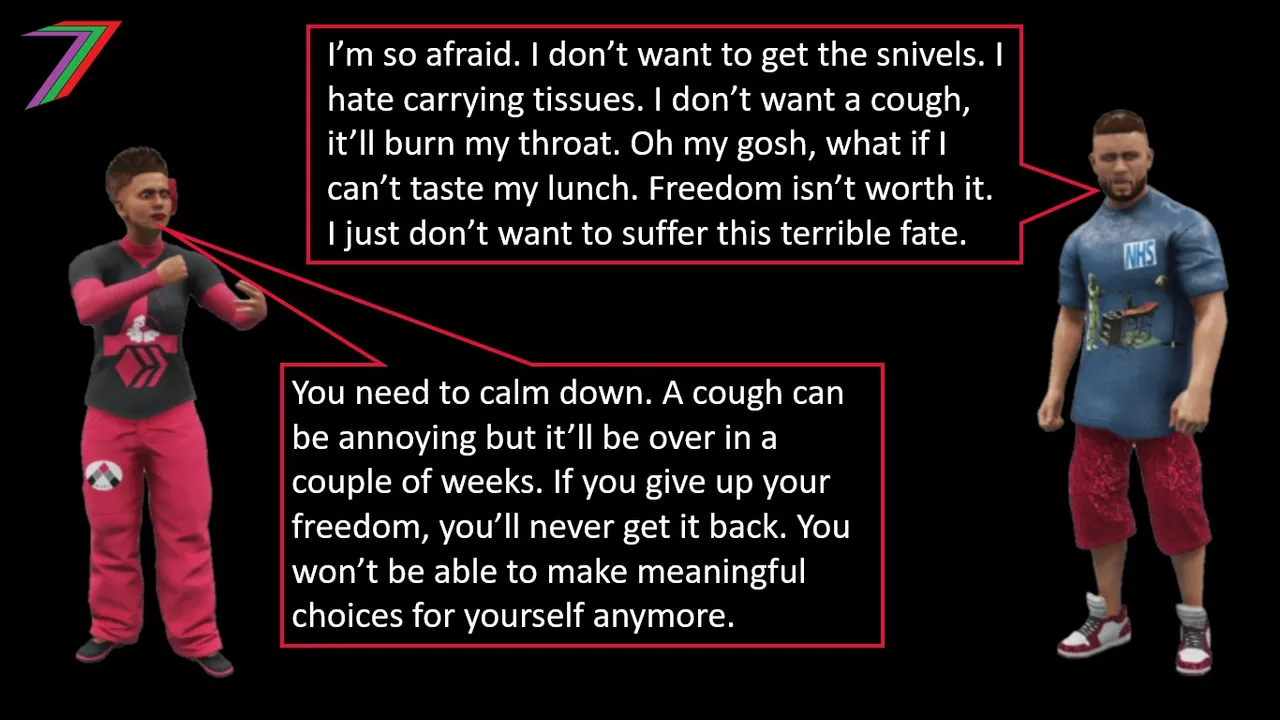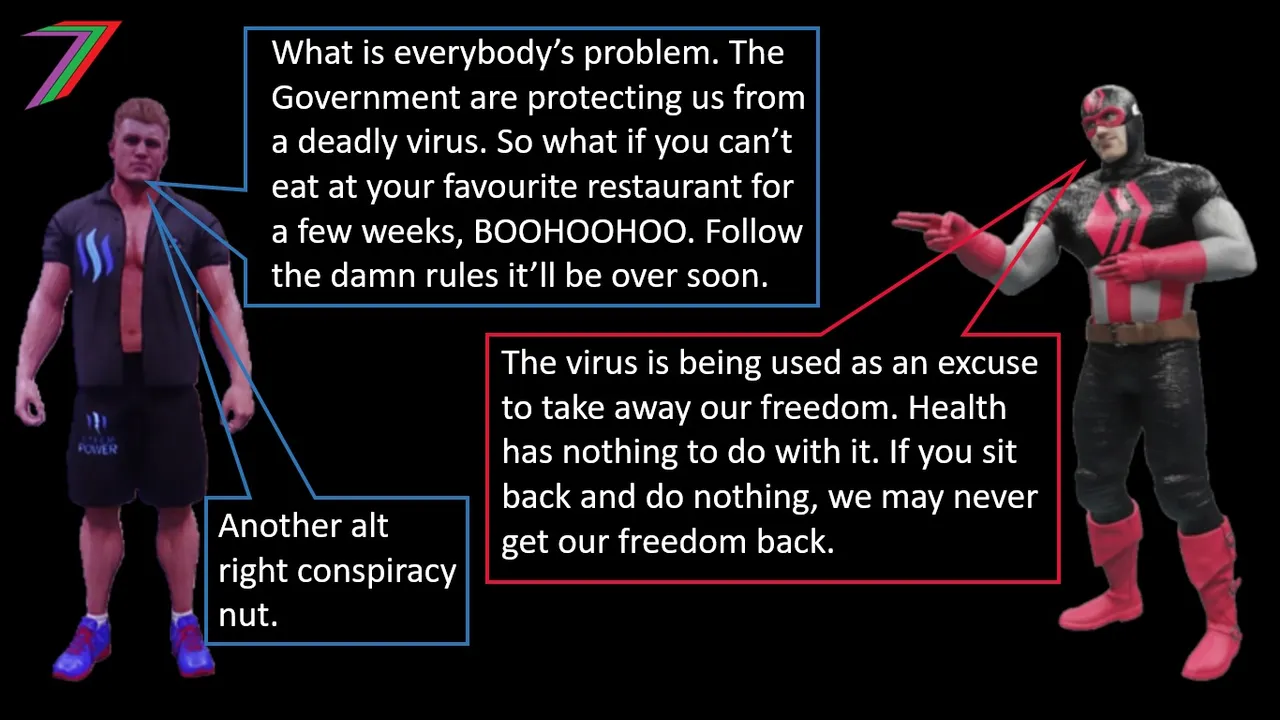Hi Everyone,

Welcome to Part 3 of my 3-Part Covid-19 Assault series. In this post, I discuss the effectiveness of the rush to totalitarian rule from the perspective of the establishment (i.e. Government, multinational corporations, banks, media, major religious groups, etc.). Before I discuss the content of this post, I have provided a brief overview of the series to provide additional context. I also recommend that you read the first two posts in this series. The links are in the section below.
Overview of the Series

Most Governments around the world have been using the Covid-19 pandemic as an all-out assault on humanity. I do not know all the motives for this coordinated assault but the core reasons will be based on the desire for more wealth and power. In my post, Power, Money and Me Me Me, I describe people’s actions and how they link to their motivations and desires. Within our current systems, people that desire power and wealth the most, in respect to anything else, are the ones that attain it.
In this series of posts, I want to discuss several important questions regarding the Covid-19 pandemic. I aim to discuss these questions from the perspective of the establishment. I am basing my discussion on the assumption that the most powerful people in the establishment only care about power and wealth. Some of them are more inclined towards power and others more towards wealth accumulation.
The questions I will be discussing are as follows:
- Part 1: Was extending the pandemic a successful strategy?
- Part 2: Were the forced closures and lockdowns effective?
- Part 3: Was the rapid implementation of totalitarian laws effective?
Was the rapid implementation of totalitarian laws effective?

As discussed in Part 2, lockdowns were the initial response to the pandemic by many countries. However, for the lockdowns to be possible, many Governments’ needed more power to authorise them. In March and April 2020, many countries declared a state of emergency. Figure 1 contains information about the states of emergency declared in Europe during that period.
Figure 1: States of Emergency and Emergency Powers in Europe

Source: European Parliament
The ICNL tracks laws across the world that, in some way, infringe on freedom. From the start of the pandemic to October 2021, the website has recorded:
- 110 countries with emergency declarations
- 58 countries with measures that affect expression
- 153 countries with measures that affect assembly
- 61 countries with measures that affect privacy
Freedom House has also investigated the impact of Government intervention on freedom during the Covid-19 pandemic. Figure 2 contains some of their findings.
Figure 2: Freedom across the world during the Covid-19 pandemic

Source: Freedom House
Note: The restrictions applied by most of Europe, New Zealand, and Australia do not appear to have been considered in the analysis
The website also explores types of abuse taking place by Governments such as electoral disruption, legislative meeting interruption, media restriction, restrictions on protests, detention or arrest, and public violence.
Did they panic (Brexit and Trumpism a sign of a waking world)?

In 2016, it appeared the world was waking up to the establishment’s gradual moves towards global control. In June 2016, the Brexit Referendum was held. This was a referendum to determine if the UK should leave or remain in the European Union (EU). The media and most politicians from both major parties supported ‘Remain’. The media conducted its usual fearmongering and some economists were predicting a serious economic downturn if the UK left the EU. A victory for ‘Remain’ was expected. However, the ‘Leave’ vote won by a narrow margin of just over 3%. The voter turnout for the referendum (72%) far exceeded any general election held in the UK so far this century. This looked like a defeat for the establishment.
In November 2016, the US Presidential Election was held. It was between Hillary Clinton, a Democrat (representing the establishment) and Donald Trump, a Republican (posing as anti-establishment). Hillary Clinton had spent decades in politics. She was the First Lady from 1993 to 2001, a senator from 2001 to 2009, and Secretary of State from 2009 to 2013. Donald Trump was a billionaire who had never held any political office. He was crass, arrogant, oddly charismatic, and had acquired fame for being outspoken and for hosting his Television Show, The Apprentice. He was considered anti-establishment because he criticized everything about the establishment, which included many well-known Republicans. He added to his anti-establishment persona by befriending conspiracy theorists such as Steve Bannon and Alex Jones. Donald Trump narrowly won the 2016 Presidential Election despite being considered the clear underdog. This looked like a defeat for the establishment.
With two big defeats in 2016, a strong totalitarian push could have been a panicked and rushed reaction. However, the rise of Trump and Brexit were most likely not defeats but rather minor setbacks. ‘Remain’ may have been the preferred outcome for the establishment but ‘Leave’ works almost as well. The bigger goal of Brexit was to divide the UK. A close outcome, even if it favoured ‘Leave’, might work better for the establishment than a landslide victory for ‘Remain’. The ‘Leave’ campaign was not without its own set of tactics. Two popular ones were savings going to rebuild the National Health Service (NHS) and control over borders, which would help capture the Nationalist votes. The years following the referendum were full of tension between people who wanted to remain in the EU and those who insisted the people’s vote be honoured. This was a clear example of the divide and conquer strategy.
The establishment most likely noticed discontentment towards their political elite. I believe Donald Trump joined the Republican Party Presidential Primaries to test the extent of the discontentment. I believe the support he received surprised them a little. However, they still had plans for him. Much of the resistance to the establishment were supportive of Trump. Therefore, Trump would be perfect to play the role of anti-establishment controlled opposition. When Donald Trump became president, he could push the establishments’ agendas with minimal opposition for as long as he maintained his attack on the Democrats (perceived by his support base as the establishment). However, having an anti-establishment president would be a hindrance to the Covid-19 agendas, which needed to be pushed fast and hard. Therefore, rigging the 2020 election to oust Donald Trump would have been deemed necessary. This would also reinforce the idea that Trump was truly anti-establishment.
The push towards totalitarianism was most likely a response to growing opposition to the establishment but it was not out of panic. It was out of perceived necessity. It was carried through quickly but the planning leading up to it was most likely well planned and rehearsed (e.g. Dark Winter).
Safety vs. Freedom

There is often a trade-off between safety and freedom. To be safe, people will choose to not engage in certain activities that they perceive dangerous even if they enjoy doing them. Likewise, to enjoy freedom, people will engage in activities that may put their safety at risk.
The Government focused heavily on the importance of safety. Almost every new law or restriction has been promoted as an act of keeping us safe. As described in Part 1: Was extending the pandemic a successful strategy?, intense fearmongering was applied using Government officials and experts, the media, social media manipulation of content, and even celebrities. Despite data and evidence suggesting that the threat from Covid-19 is minuscule to the majority of the population, most people were deceived by the strong fearmongering campaign.
The obsession with safety and being protected has overshadowed the importance of freedom. Many people have become too afraid to be truly free. The establishment have capitalised on this fear by taking away freedom when people’s focus has been on keeping safe. The aim is to remove freedoms for long enough that people become accustomed to not having them. Freedom will shift from a ‘right’ to a ‘privilege’ that is only rewarded to those that surrender to the totalitarian regime. If this is the case, the concept of freedom is lost.
The rapid implementation of totalitarianism was considered necessary as the pandemic could only be dragged out for a limited period.
We have grown too comfortable

Most people living in the western world have enjoyed relative prosperity compared to previous generations who have endured hardships of various forms (e.g. world wars, starvation, plagues, etc.). This has likely caused us to become comfortable. Most people in the west are able to fulfil their needs whenever they want. Credit makes this possible even when money is not immediately available on hand. Becoming comfortable may have also made us complacent, which may have taken away our desire to fight for something.
The totalitarian push (i.e. perceived as necessary Government intervention) might be conceived as a temporary inconvenience that will go away once the pandemic has ended. If taking a few injections returns life back to being comfortable, it might be considered worth it. There does not seem to be a need to rebel or fight back because life is still "fine".
As time goes by and life does not return to normal, the blame is pushed to the people who are not complying with the totalitarian push. The perception is life would have returned to normal if everyone had just listened to the Government and their experts. The desire to rebel or fight would not have grown, as it is perceived as counterproductive and possibly dangerous. Many people will continue to live in denial believing life will return to normal because that is what the Government intends to do. After all, life has been good for decades or for most people, even a lifetime. Why would the Government want to end that now?
For most, a point will come when life has deteriorated to a point where some form of action is desired. However, at this point rebelling might be seen as impossible as the establishment has grown too strong. Previous efforts by others to fight back would have failed because too few people supported them. Any future rebellion could be deemed as equally likely to fail because people are unable to support and coordinate themselves.
Totalitarianism (fascism vs communism)

Totalitarian regimes need to have some form of structure. The only mainstream opposition the totalitarian movement is facing is coming from the ‘right’ of politics or more correctly, should be referred to as: the anti-establishment controlled opposition. As the audience for the criticism are mostly supporters of ‘right’ ideology, the blame for the totalitarianism is linked to ‘left’ ideology. Therefore, the totalitarianism is branded as a movement towards communism. Communism is often implemented as an authoritarian regime. The Government, who are presumably supposed to represent the people, own and control everything. The form of totalitarianism we are facing does not closely resemble a communist form of totalitarianism. The large private companies and the world’s richest are mostly supporting the push towards totalitarianism. They would not support communism as it involves the state taking control and ownership over assets. Instead, the Governments are enabling the growth of the largest businesses.
The lockdowns, closures, restrictions and laws are causing free-market capitalism to collapse. Governments are paying people not to work or become dependent on them. This may appear to be a move towards communism but it is an attack on free-market capitalism. Attacking free-market capitalism is not a trait purely exclusive to communism or socialism. Fascism also attacks free-market capitalism by attempting to replace it with crony capitalism. The actions of Government are strongly promoting crony capitalism. This is happening through the transfer of wealth to the rich and direct intervention in the economy through the private sector. Government sectors, such as healthcare, are not expanding but instead are collapsing. The numbers of public sector healthcare workers are dwindling and are being further reduced as those refusing to be vaccinated are being suspended or even fired.
It appears that people swayed by ‘left’ political ideology are supportive of the Governments’ totalitarian push. This is likely because they believe it is being done for the good of society as a whole (i.e. they have been duped by all the lies) and that Government intervention is good (i.e. aligns with ‘left’ ideology). Many of the ideas behind socialism and even communism can be promoted as virtuous. Ideas such as fairness and equality can sound appealing even if they need to be enforced. Fascism or alt-right ideologies cannot sound appealing unless they are disguised as something else. The current totalitarian push is a not a push towards communism and its true intentions do not even closely represent ‘left’ ideology. The establishment do not desire communism because many of their largest players are prominent in the private sector (i.e. a corrupt communist system with sneaky backroom deals with nameless millionaires would not work). The existing 2-party system would also not function in a communist system, as competing ideologies are required. Competing ideologies would destabilise a communist system, as it would be under constant threat.
The establishment would rather have a totalitarian system closer to fascism. The fascism type model can keep both the power hungry in Government and the wealth hungry in the private sector happy. Fascism would be compatible with the 2-party system if at least one party can convince the public that they support ‘Left’ ideology. The new totalitarian system would still need to depart from traditionally fascist ideology in several areas. It will need to involve more power sharing amongst leaders in the establishment (i.e. no Hitler or Mussolini figures). It will not be able to be brazenly racist. However, prejudice and discrimination will remain a prominent feature but it will be disguised as something else. It will not have the appearance of strong militarised nationalism because it will not be needed, as the totalitarian push is already global and ‘hot’ wars are not required to obtain global dominance. However, wars will still be needed to maintain diversion amongst the people to prevent unison against the global regime. It will be a system that the establishment believe will fool the global public long enough so that they never be able to break out of it.
Paving the way for the Great Reset

The Covid-19 pandemic totalitarian movement is paving the way for the Great Reset. I have written a series of posts, which summaries the Great Reset book by Professor Klaus Schwab and Thierry Malleret; see links below.
- My summary and opinions regarding ‘The Great Reset’ – Part 1: Introduction
- My summary and opinions regarding ‘The Great Reset’ – Part 2: Macro Reset (Economic and Societal Resets)
- My summary and opinions regarding ‘The Great Reset’ – Part 3: Macro Reset (Geo-political, Environmental and Technological Resets)
- My summary and opinions regarding ‘The Great Reset’ – Part 4: Micro Reset
- My summary and opinions regarding ‘The Great Reset’ – Part 5: Individual Reset
- My summary and opinions regarding ‘The Great Reset’ – Part 6: Conclusion
I also wrote the post ‘A Peripheral look at the Great Reset and Fourth Industrial Revolution’, which explores the content on the World Economic Forum’s website relating to the Great Reset.
The Great Reset aims to move the world towards centralised governance and control. It attempts to frame most major problems as global issues that require global solutions. This will be done with global cooperation through global agencies. The response to Covid-19 has been an unofficial global response with most countries adopting strict draconian laws to control the pandemic. The Great Reset would prescribe a similar response to all problems global authorities deem as global. I would expect these responses to be swifter, more coordinated, and even more draconian than the ones we mostly saw for the Covid-19 pandemic. I would expect them to more closely resemble the response New Zealand and Australia had to just a handful of Covid-19 cases; see my post The fall of Australia plus my experience prior to the fall. Global authorities are likely to herald the New Zealand/Australia approach a success because of the low number of cases and deaths compared to the rest of world even though the actions they took had no part to play in it.
The Great Reset is being promoted as a global response to create a fairer, more equitable, safer, greener, and healthier world. Many of these align with the virtues currently being promoted by the ‘left’ aka ‘establishment side’ of politics. The initial sacrifice will be freedom and individuality. The overall sacrifice will be happiness, as all that is offered will mean very little in the absence of choice.
Verdict

Global totalitarian rule by the establishment has been on the agenda for a long time. The world has been heading in that direction for a long time. Whenever, there is an emergency of some magnitude, new stricter rules and laws are implemented and Government policy and actions become more invasive and intrusive; take 911 for example. Regardless of how Covid-19 began, it was an opportunity the establishment seized with great force. The pace and extent may have hastened due to public awakening to the establishment’s desire for power and wealth but it was not panicked or rushed. It was done now to avoid greater resistance later on.
The effectiveness of the current totalitarian push is still difficult to determine. They gained power and control at a faster pace but resistance is also growing at a faster pace. If the establishment are moving closer to their next goal outlined by the Great Reset than the resistance is to reaching critical mass, the push has been effective. The totalitarian march is off to a head start but momentum is difficult to maintain as reasons for implementing draconian laws and rules are harder to support, as more information becomes known despite the efforts to censor it. The extent of resistance is still inadequate to change our current trajectory away from the Great Reset. However, momentum is building and more people are willing to stand up and act. We will have our answer within the next few years.
Series Round Up

In this series, I asked three questions about the Covid-19 pandemic. I adopted the approach of investigating these questions from the perspective of the establishment. I wanted to explore the logic of the moves that have been made. I wanted to determine if these moves have been successful or effective in achieving what I perceive to be the main objectives of the establishment.
At this point, the establishment have succeeded in prolonging the pandemic, they have reaped many benefits from the lockdowns, and they have managed to advance, rapidly, a totalitarian agenda. We could perceive that as a great success. To do so would be short-sighted. Throughout history, groups of self-proclaimed elites have tried to seize as much power and wealth as possible. Many times, there has been short-run success. However, in the long-run, domination wanes and people’s desire for freedom wins. The establishment know their history. That is why these latest attempts for power have involved deceiving people into calling for their own imprisonment and enslavement. If people are unaware of their own enslavement, they will not rebel against it. The answer is to open as many as eyes as possible to what is going on. Those, who can see the truth, should feel compelled to share what they know, for they will realise that the unknowing will inflict their fate on the knowing.
More posts

If you want to read any of my other posts, you can click on the links below. These links will lead you to posts containing my collection of works. These 'Collection of Works' posts have been updated to contain links to the Hive versions of my posts.
My CBA Udemy Course
The course contains over 10 hours of video, over 60 downloadable resources, over 40 multiple-choice questions, 2 sample case studies, 1 practice CBA, life time access and a certificate on completion. The course is priced at the Tier 1 price of £20. I believe it is frequently available at half-price.
Future of Social Media





